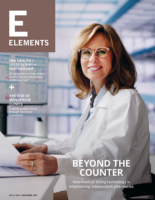Nearly 14 percent of all patients discharged from the hospital will be readmitted within 30 days, according to the Nationwide Readmissions Database. That number is even higher for Medicare patients, who often juggle multiple medications given by different prescribers. Independent pharmacist Alok Patel serves a large population of Medicare patients in his New Jersey-based pharmacies, and he saw the problem first-hand.
“A lot of people would come home from healthcare facilities and they would have no clue about their medications,” he explained. “There would be chances of them duplicating their therapies or negative drug interactions.”
So he founded a program to help discharged patients better understand, manage, and adhere to their medications and devices—Discharge Rx Care. The program partners patients with pharmacists who guide them through the process of discharge from a healthcare facility, such as a nursing home or a hospital, and helps them resettle back at home.
While the program increases adherence and reduces hospital readmissions, it pays off for Patel’s business, too, because it provides a steady stream of new patients to his pharmacy. Patients are impressed by the service and give him their prescription business once the program ends. “It’s a compounding kind of effect,” Patel said. “I have more and more patients coming back to me after discharge for the program.”
How it works
The key to the Discharge Rx Care program is continued contact. A pharmacist first visits patients before they are discharged from their healthcare facility. During this visit they go over how to take their new medications and how they might interact with any medications they were taking before being admitted to the hospital.
The education isn’t limited to oral medications. Patients might be going home with new medical devices like nebulizers, inhalers, or insulin pens, which can sometimes prove to be overwhelming. Discharge Rx Care has created more than 200 videos that show patients how to use the devices.
“What we have found is when we show them the videos, they more clearly understand how to use those devices when they go home,” Patel explained. “In the healthcare facility, they have nurses to help them administer everything, but at home, they can get confused with all these new medical devices.”
The assistance doesn’t stop once they leave the healthcare facility. At home, the patient will receive a follow-up call every Saturday for the next three weeks. The pharmacists even send patients relevant videos to their smartphone, so they can watch them until they feel comfortable using their medical devices at home.
“If we give them one month of medication but don’t do the follow-up call, we don’t know whether the patient is adhering or not,” Patel said. “But when we make the phone calls, we have a set of questions to ask them and a set of reminders to help them adhere to their therapies.” These follow-up calls have increased medication adherence by 80 percent, Patel said.
The program’s services are provided to patients and nursing facilities free of charge. The only expense patients ever see is the copay for their prescriptions, which they would have to pay at their regular pharmacy without the benefit of getting discharge counseling.
Preventing confusion
“In my community, there are a lot of seniors, and seniors have a bunch of medication sitting in their medicine cabinet,” Patel said. “Any time they visit any hospital, they get another list of discharge medications.”
Many times, a medication prescribed at the hospital is a duplicate of a medication the patient is already taking. Their primary care doctor might have prescribed them something for their cholesterol, but when they were admitted to the hospital, the hospital physician prescribed them a different medication to treat cholesterol.
Because of this, Patel said, “There’s definitely a need for a program that can do a complete, thorough reconciliation of their medications to avoid any complication of their therapies.” Without the pharmacists scrutinizing these medication lists and helping patients understand what they need to be taking, the risk of re-hospitalization rises.
That’s why the Discharge Rx Care program appeals to nursing homes in addition to appealing to individual patients. “A lot of nursing homes are looking for these types of programs because Medicare will penalize them if they have a re-hospitalization of their patient after they’ve been discharged,” Patel said. “This is a quality-evaluated program for the nursing home. They can share their data with the hospital and Medicare and show that when
Five years of growth
Initially, the Discharge Rx Care program was a hard sell to the nursing homes. “They all loved the program but they weren’t sure whether it would be possible,” Patel recalled. “It was challenging to convince other healthcare professionals that the program would survive after they implemented it at their facility, because I would hire a pharmacist to stay at my location, then I would go out to the building to meet patients.”
But Patel managed to convince that first nursing home to give him a chance. He began the program with two other employees and that single client, and five years later Discharge Rx Care works with patients from over 60 nursing homes and employs nearly 50 people.
“What I’ve found is that there is a ‘wow’ effect,” Patel said. “A patient could be 70 years old, but they’ve never had the experience of a pharmacist coming to them and providing personal care and education.”
This “wow factor” is what makes Discharge Rx Care sustainable in the long run. It allows patients to experience the human touch of independent pharmacies. Many of the Discharge Rx Care patients switch to one of the five pharmacies Patel owns after their counseling sessions are over instead of returning to the chain pharmacy they had been using before.
As an incentive, Patel’s independent pharmacy offers the same adherence packaging and home delivery patients were receiving while they were being counseled by Discharge Rx Care. That way, even though the program is free, Patel said, “The financial benefit is that I see people coming back to us. Over the years, I’ve seen an increase in patients returning after receiving our services.”
From the Magazine
This article was published in our quarterly print magazine, which covers relevant topics in greater depth featuring leading experts in the industry. Subscribe to receive the quarterly print issue in your mailbox. All registered independent pharmacies in the U.S. are eligible to receive a free subscription.
Read more articles from the March issue:
- How to use analog marketing to earn more business than you’ve ever had
- What will the novel coronavirus do to the pharmaceutical supply chain?
- Help patients quit smoking with new guidelines from the Surgeon General
- Lessons in innovation from pharmacy trendsetters at the NCPA NICE awards
- How to use a mobile app to increase patient engagement, adherence, and loyalty
- How to find fair market value when purchasing a pharmacy
- An online training program prepares technicians for certification
An Independently Owned Organization Serving Independent Pharmacies
PBA Health is dedicated to helping independent pharmacies reach their full potential on the buy side of their business. The company is a member-owned organization that serves independent pharmacies with group purchasing services, expert contract negotiations, proprietary purchasing tools, distribution services, and more.
PBA Health, an HDA member, operates its own VAWD-certified warehouse with more than 6,000 SKUs, including brands, generics, narcotics CII-CV, cold-storage products, and over-the-counter (OTC) products.
Want more pharmacy business tips and advice? Sign up for our e-newsletter.












